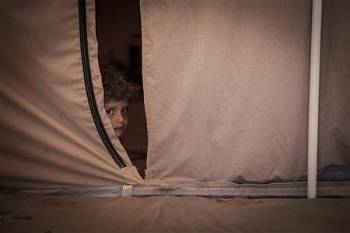On a winter morning in January, Majed, 13, and his friend Omar, 11, were heading to a public park near their homes in eastern Aleppo to play and ride their bikes.
It was only two weeks since the December ceasefire began, and the lull in fighting allowed the two friends and many children in the neighborhood to venture outside.
On their way to the park, they spotted a "strange" metal object buried in the sand.
"It looked like a soda can. I stepped on it, and it exploded," Majed recalled.
"I was thrown in the air, but I never lost consciousness," he said. "I was worried about Omar, I didn't know how to help."
People rushed to the scene to find Majed and Omar severely wounded.
Shrapnel tore through Majed's face and body, causing some of his intestines to be removed. But he was lucky that his foot was not amputated.
"I was so cold and in pain," he said.
Majed's friend Omar did not make it to the hospital. He died inside the taxi five minutes after two men rescued them.
Majed and Omar's story is told in a UNICEF report published on Monday. Despite an ongoing ceasefire, deadly incidents - such as those experienced by the boys - continue, highlighting what UNICEF said was the "highest on record" level of "grave violations against children" in Syria since the war began in 2011.
"Verified instances of killing, maiming and recruitment of children increased sharply last year in a drastic escalation of violence across the country," the report said.
According to the report, at least 652 children were killed in the last year, making 2016 the worst year for Syria's children since verification of child casualties began in 2014.
Of that number, 255 children were killed in or near a school in 2016, UNICEF said.
The number of child fatalities in 2016 was at least 20 percent higher than in 2015. At least 647 children were also reported injured, including Majed.
There were also at least 338 attacks against hospitals and medical personnel.
In one incident in November, Al Jazeera captured the moment an air raid hit a children's hospital in eastern Aleppo, forcing medical staff to evacuate patients, including several newborn babies still in incubators.
"The depth of suffering is unprecedented," UNICEF Regional Director Geert Cappelaere said in a statement.
"Millions of children in Syria come under attack on a daily basis, their lives turned upside down. Each and every child is scarred for life with horrific consequences on their health, well-being and future."
Aside from the child fatalities, UNICEF also recorded that more than 850 children were recruited to fight in the conflict - double the number recruited in 2015.
"Children are being used and recruited to fight directly on the front lines and are increasingly taking part in combat roles, including in extreme cases as executioners, suicide bombers or prison guards."
After six years of conflict, nearly six million children now depend on humanitarian assistance, a twelve-fold increase from 2012, with millions of children being forced to evacuate multiple times.
UNICEF said that reporting in some areas remains a challenge, with 2.8 million children living in hard-to-reach areas, including 280,000 living under siege and cut off from humanitarian aid.
"Beyond the bombs, bullets and explosions, children are dying in silence often from diseases that can otherwise be easily prevented," the report said.
"Access to medical care, lifesaving supplies and other basic services remains difficult."
More than 2.3 million Syrian children are now living as refugees in Turkey, Lebanon, Jordan, Egypt, and Iraq, the report said.
Those who have managed to stay or return to their homes, like the families of Majed and Omar in eastern Aleppo, are no less vulnerable to life-threatening risks such as unexploded ordnance.
According to the report, at least 88 percent of explosive remnants are a life-threatening hazard, and 75 percent of incidents involving explosive weapons occurred in densely populated areas, including eastern Aleppo.
Recalling the day her son was wounded, Majed's mother said she was at the market when she heard about the explosion.
"Two children were [reportedly] injured in a bomb, and one of them was killed," she said. "They were saying it was Majed. There was no more bitter feeling a mother could have."
While Majed recovers from his injuries, he said he holds onto a dream of continuing his education, having lost four years of schooling to the war.
"I stopped going to school when the fighting escalated. I was excited to go back to school this semester but I still need help to walk and eat," he said. "I can’t wait to go back when I recover.”
Majed said he has a message for other children: "I now tell all my friends and neighbors to never approach deserted parks and never play with strange items. It can kill them."
PHOTO CAPTION
Syrian refugee Nawara, 5, peers out from her tent in Za'atari Refugee Camp, Jordan, September 6, 2012. REUTERS
Al-Jazeera


 Home
Home Discover Islam
Discover Islam Quran Recitations
Quran Recitations Lectures
Lectures
 Fatwa
Fatwa Articles
Articles Fiqh
Fiqh E-Books
E-Books Boys & Girls
Boys & Girls  Ramadan
Ramadan Fatwa Audios
Fatwa Audios Month of Mercy
Month of Mercy Women
Women Eed Al- Fitr
Eed Al- Fitr Food Recipes
Food Recipes Videos
Videos

 Prayer Times
Prayer Times












